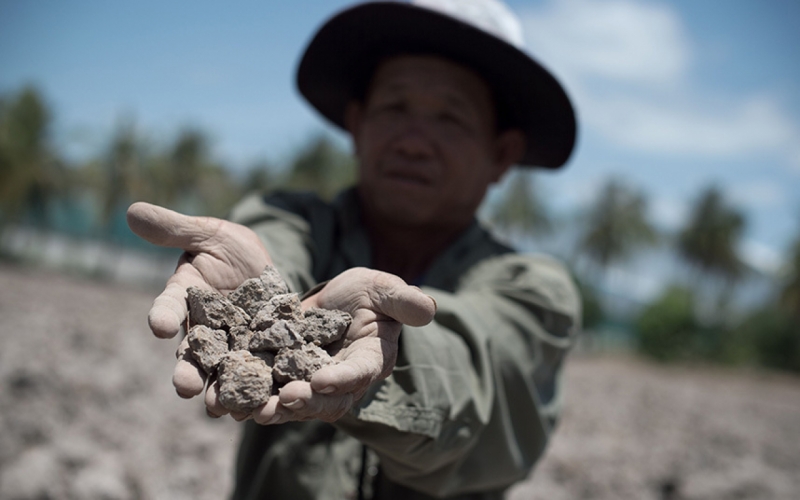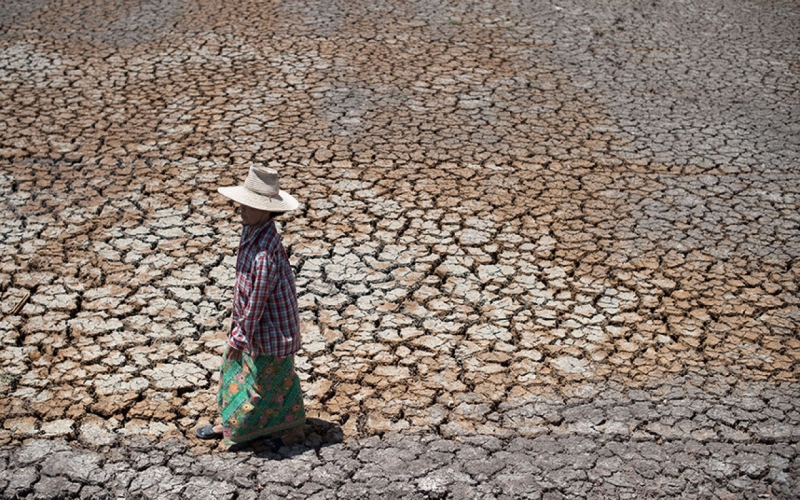




It was only a few weeks ago when the weather in Thailand changed drastically from refreshingly cool to oven-hot; when coats and jackets were put back in the closet to be replaced by thinner, more comfortable cotton wear; when electricity bills suddenly soared, even doubled, as one had no choice but to turn up their air conditioners into its maximum coolness because the heat is just too much.
It’s dry season in Thailand all over again. But this time, it’s not your ordinary ‘dry’.
Drought: The Hot Issue
Thailand is experiencing its worst drought in decades.
This is according to a news report from Bangkok Post. "More than half of Thailand is gripped by water shortages from the drought, with 43 provinces across the country being hit by water scarcity.” These provinces include Chiang Mai, Khon Kaen, Phitsanulok, Kanchanaburi, and Songkhla, among others.
Additionally, 60 districts in 15 provinces had been declared drought disaster zones while water levels in all major rivers were still mostly low. In fact, water supplies in the four main dams of the Chao Phraya River basin continue to fall, forcing authorities to dramatically lower mains pressure to popular tourist areas over Songkran, a popular Thai festival.
According to another report from Bangkok Post, dam director Worawit Raweenipapong said the water level of the reservoir had dropped to below critical point. “It has just 16 million cubic metres of usable water, or 1% of capacity, which will feed taps only until April 4.”
This puts many important sectors in the country at risk.
Agri-Trouble
The drought is taking its toll on the country’s rice farmers. Apparently, Thailand's prime minister told farmers to cultivate less rice to help the country handle its intensifying water crisis in this year’s “worst drought in two decades,” reported GMA News Online.
“Thailand is one of the world's top rice exporters, but four consecutive years of below-average rainfall has drained water reserves and left irrigation channels in the heart of the country dry.” Because of this, many rice farmers are currently unable to gather enough water to plant second crops, shaving their incomes and plunging many into debt.
The same problem in drought rings true for the livestock sector, as production costs are expected to rise. According to a news article entitled Livestock sector's fears grow over drought's costs, concerns about the impact of an escalating drought on livestock products are growing, with state authorities vowing to closely monitor price movements and supply daily for the next three months.Authorities were worried about higher production costs caused by a water shortage in the farm sector.The price of animal feed could also increase because of drought conditions.
Water normally accounts for 30% of swine farming costs, and with drought conditions at critical point, many farmers were prompted to sell their young breeding stock. Unfortunately, less livestock means less income, and less income denotes a lower quality of life.
Travel Hassle
Surprisingly, even the tourism sector is a hot target by the extremely dry weather.
According to a news report by Chinnawat Singha, drought has forced the closure of accommodations at well-known Phu Hin Rong Kla National Park straddling Phitsanulok, Loei and Phetchabun provinces from April 1, said park chief Suwan Phanunampha. Mr. Suwan said drought has become more serious, causing water sources across the park to dry up.
This has severe implications in the provinces’ tourism, and consequently, their economy. “The water shortage, coupled with the start of low season, prompted park officials to ask the National Parks, Wildlife and Plant Conservation Department to allow them to halt bookings for living quarters inside the park, fearing there won't be enough water for visitors,” Singha added.
Even hotels, from the 400-baht-a-night to the most luxurious ones, are on drought alert. Hoteliers in major tourist destinations are preparing measures to deal with the serious drought this summer, with members of the Thai Hotels Association (THA) running water-saving campaigns after being warned that this year's drought will be difficult to deal with.
“We have asked for cooperation from our member hotels to help save water. The drought is expected to be a big problem the whole nation will face together," said THA president Surapong Techaruvichit, as reported by Bangkok Post.
Dry Land, Dry Economy

All these quandaries lead to a major decline in the country’s overall economy.
According to Reuters, the drought is expected to cut economic growth by 0.6 to 0.8 of a percentage point this year, with predictions of an even more severe impact if the dry weather continues after mid-year, the University of the Thai Chamber of Commerce says. This adds to the problems of Southeast Asia's second-largest economy, which is still struggling to expand.
“The drought is expected to last until June, when the rainy season usually begins, costing the country about 119 billion baht. However, the damage could reach 154 billion baht if it continues until October”, Thanavath Phonvichai, an economics professor, told a news conference, according to Reuters.
The predicament, unluckily, does not end with economy.
Feeling the Burn
Now that almost all vital sectors in Thailand’s socio-economic landscape are visibly affected, there is no denying the extreme effects drought can bring, and the larger problem of climate change that caused it.
But what’s even more frightening is the phenomenon’s effect on human lives, and the looming threat it poses to the future generation. The unbearable heat is not only the usual fickle weather people are so used to; it is a sign that something in the universe is seriously, irreparably damaged. Today’s drought is only a warning of what lies ahead.
At this very moment, as people max their air conditioners, drink cool beverages and put on their sunscreens, may they consider not only protecting themselves from the scorching heat, but saving planet earth, as a whole, from burning down.
Here is to taking action now, and ensuring that communities across the nation will never run dry.